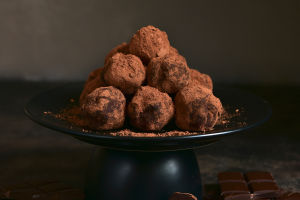When we think of energy snacks, a certain popular brand often comes to mind: "Sweeping away hunger, being yourself." However, the energy snacks we usually think of aren't technically true energy snacks.
So, what exactly is an energy bar? Does it make us gain weight, or can it help us lose weight? Let’s explore together!
What Exactly is an Energy Bar?
As the name suggests, an energy bar is a food item designed to provide a significant amount of energy in a convenient, bar-like form. In 1980, Canadian marathon runner Brian Maxwell and his wife, in order to tackle the critical issue of glycogen depletion during marathons, decided to create a food that could quickly replenish energy during physical activities. Six years later, Maxwell launched the Power Bar, a product specifically designed for athletes.
This marked the birth of the modern energy bar. Over time, energy snacks became popular among marathon runners and were eventually discovered by hikers and cyclists, who found that they could indeed boost performance. Fast forward to today, energy snacks have become increasingly common, with flavors more varied than ever.
Different Types of Energy Snacks
Energy snacks lack a universally agreed-upon definition, and their variety is vast. However, we can broadly categorize them into two types:
1. Grain Snacks / Nut Snacks:
Grain snacks primarily use ingredients like oats, wheat, and rye, with oats being a great source of fiber and complex carbohydrates. These are easy to buy and even make at home. On the other hand, nut-based energy snacks are higher in fats, but most of these are healthy unsaturated fats. They also tend to be high in protein, making them a healthy choice when consumed in moderation. However, store-bought grain snacks can sometimes contain excessive sugar and unhealthy fats, so be cautious.
2. Protein Snacks:
Protein snacks typically contain 10-20 grams of protein, which accounts for about 20% of your daily protein intake. They help replenish protein before or after workouts and promote muscle growth. In China, where diets are typically carb-heavy and protein is lacking, protein snacks can be an excellent supplement, especially for those trying to balance their nutrition while avoiding excess calories.
Benefits of Energy Snacks
Now that we know what energy snacks are, what are their benefits?
1. A Healthy Snack Between Meals:
We’ve all experienced the hunger pangs between meals. Eating too much before a meal can leave us unable to finish, but not eating can lead to dizziness or poor concentration. At these times, an energy bar can be the perfect solution. They offer a well-balanced calorie count and a variety of flavors to satisfy cravings without ruining your diet.
2. Support for Exercise and Fitness:
Energy snacks are packed with protein, which provides not just energy but also essential nutrients for the body. If you have a regular exercise routine or are into fitness, adding energy snacks to your diet can replenish the protein, amino acids, and other nutrients you lose during physical activities, helping you maximize the benefits of your workout.
3. Convenience:
Compared to other meal replacements or protein foods, energy snacks are the most convenient. They are small, portable, and require no preparation. You simply open the package, and you’re good to go. With flavors resembling regular snacks, they’re easier to consume and enjoyable as well.
How to Choose the Right Energy Bar
Although energy snacks are simple and convenient, choosing the right one requires some thought. Consuming a low-quality energy bar could lead to weight gain and strain on your body.
1. Check the Calories:
Whether you're aiming to build muscle or control your weight, it’s essential to calculate the calories. Energy snacks vary in calorie content depending on their flavor and purpose. If you're using it as a snack, choose snacks with no more than 220 calories. For meal replacement, look for snacks with 300-400 calories.
2. Sugar Content:
Some energy snacks claim to aid weight loss but contain significant amounts of sugar, sometimes more than a chocolate bar. Excessive sugar leads to fat gain, not health. Always check the sugar content; ideally, it should be under 10 grams per 30-gram serving.
3. Protein Content and Ingredients:
Don’t just go for a bar labeled as "protein-packed"—the quality and quantity of the protein are what matter most. A good energy bar should contain 10-20 grams of protein, with the best options including whey protein or a combination of whey and casein. Some snacks might claim to have protein but use cheaper soy protein, so check the ingredients carefully.
4. Carbs and Fats:
In a decent energy bar, carbs should be lower than the protein content, with an ideal ratio of 1:2. Fat content is essential for energy snacks used as meal replacements but should be low (around 5 grams) if consumed after a workout to avoid excess fat absorption.
Common Questions About Energy Snacks
1. Is Using Energy Snacks for Weight Loss a Mistake?
While energy snacks are nutritionally rich compared to fast food, relying solely on diet control without combining it with exercise won’t yield long-term results. Pairing energy snacks with a balanced fitness plan is essential for sustainable weight management and improving metabolism. Additionally, don't forget to include fresh fruits and vegetables for a complete diet.
2. When is the Best Time to Eat Energy Snacks?
The timing of your energy bar intake depends on its purpose. If it’s a snack, eat it when you’re hungry, post-workout, or during physical activities. If it's meant as a meal replacement, consume it around regular mealtimes, but avoid eating too much before bed, as your body may not fully absorb the nutrients.
3. Can You Make Your Own Energy Snacks?
Relying on a single food for weight loss isn’t the key to success. A balanced homemade meal provides more nutrients than an energy bar. Always remember that a balanced diet and regular exercise are the most effective ways to maintain a healthy weight.
Energy Snacks Can Be Beneficial If Used Correctly
Energy snacks are an excellent option when you're in need of a quick, nutritious snack. By choosing the right one and using it at the right time, they can help boost your energy and support your fitness goals. However, for those looking to lose weight, energy snacks should complement a balanced diet that includes regular exercise and plenty of fresh, whole foods. Make informed choices and stay healthy, Lykkers!


